

World Intellectual Property Organization. WIPO members Members Non-members.
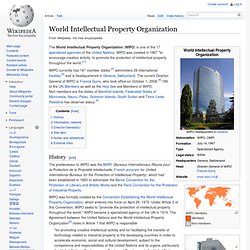
World Meteorological Organization. World Health Organization. The World Health Organization (WHO; /huː/) is a specialized agency of the United Nations (UN) that is concerned with international public health.
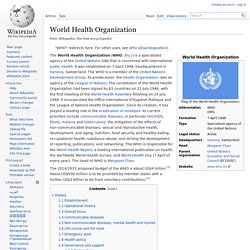
It was established on 7 April 1948, headquartered in Geneva, Switzerland. World Food Programme. The World Food Programme (WFP; French: Programme Alimentaire Mondial; Italian: Programma Alimentare Mondiale; Spanish: Programa Mundial de Alimentos) is the food assistance branch of the United Nations and the world's largest humanitarian organization addressing hunger and promoting food security.[1] On average, the WFP provides food to 90 million people per year, of whom 58 million are children.[2] From its headquarters in Rome and more than 80 country offices around the world, the WFP works to help people who are unable to produce or obtain enough food for themselves and their families.
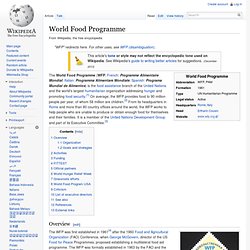
It is a member of the United Nations Development Group and part of its Executive Committee.[3] Overview[edit] The WFP was first established in 1961[4] after the 1960 Food and Agricultural Organization (FAO) Conference, when George McGovern, director of the US Food for Peace Programmes, proposed establishing a multilateral food aid programme. World Bank Group. The World Bank Group (WBG) is a family of five international organizations that make leveraged loans to poor countries.
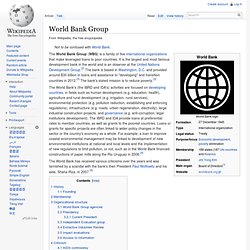
It is the largest and most famous development bank in the world and is an observer at the United Nations Development Group.[2] The bank is based in Washington, D.C. and provided around $30 billion in loans and assistance to "developing" and transition countries in 2012.[3] The bank's stated mission is to reduce poverty.[3] The World Bank's (the IBRD and IDA's) activities are focused on developing countries, in fields such as human development (e.g. education, health), agriculture and rural development (e.g. irrigation, rural services), environmental protection (e.g. pollution reduction, establishing and enforcing regulations), infrastructure (e.g. roads, urban regeneration, electricity), large industrial construction projects, and governance (e.g. anti-corruption, legal institutions development).
Universal Postal Union. UPU member states, including dependencies covered by their membership UPU member state dependencies with separate membership state represented in UPU by another state special observer status See List of members of the Universal Postal Union for full details.
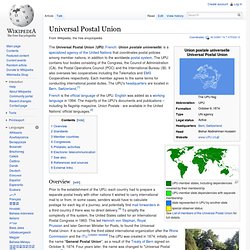
World Tourism Organization. The United Nations World Tourism Organization (UNWTO) is the United Nations agency responsible for the promotion of responsible, sustainable and universally accessible tourism.
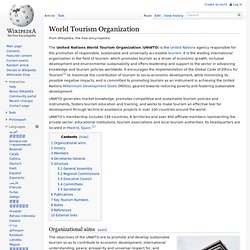
It is the leading international organization in the field of tourism, which promotes tourism as a driver of economic growth, inclusive development and environmental sustainability and offers leadership and support to the sector in advancing knowledge and tourism policies worldwide. It encourages the implementation of the Global Code of Ethics for Tourism[1] to maximize the contribution of tourism to socio-economic development, while minimizing its possible negative impacts, and is committed to promoting tourism as an instrument in achieving the United Nations Millennium Development Goals (MDGs), geared towards reducing poverty and fostering sustainable development. Organizational aims[edit] History[edit] Members[edit] UNWTO member states UNWTO associates UNWTO observers. United Nations Industrial Development Organization.
The United Nations Industrial Development Organization (UNIDO), French/Spanish/Portuguese acronym ONUDI, is a specialized agency in the United Nations system, headquartered in Vienna, Austria.
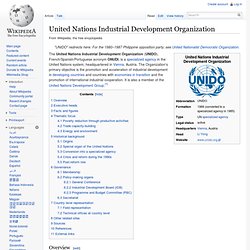
The Organization's primary objective is the promotion and acceleration of industrial development in developing countries and countries with economies in transition and the promotion of international industrial cooperation. It is also a member of the United Nations Development Group.[1] Overview[edit] UNIDO believes that competitive and environmentally sustainable industry has a crucial role to play in accelerating economic growth, reducing poverty and achieving the Millennium Development Goals. UNESCO. The flag of UNESCO.
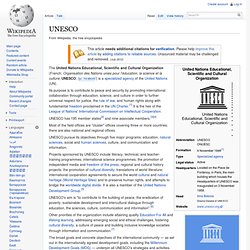
The United Nations Educational, Scientific and Cultural Organization (French: Organisation des Nations unies pour l'éducation, la science et la culture; UNESCO; /juːˈnɛskoʊ/) is a specialized agency of the United Nations (UN). UNESCO has 195 member states[2] and nine associate members.[3][4] Most of the field offices are "cluster" offices covering three or more countries; there are also national and regional offices. UNESCO pursue its objectives through five major programs: education, natural sciences, social and human sciences, culture, and communication and information. International Telecommunication Union. Monument in Bern, Switzerland.
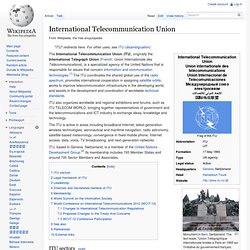
The text reads: "Union Télégraphique Internationale fondée à Paris en 1865 sur l'initiative du gouvernement français. Érigé par décision de l'Union Télégraphique prise à la conférence internationale de Lisbonne en 1908. " International Monetary Fund. The International Monetary Fund (IMF) is an international organization headquartered in Washington, D.C., of "188 countries working to foster global monetary cooperation, secure financial stability, facilitate international trade, promote high employment and sustainable economic growth, and reduce poverty around the world.
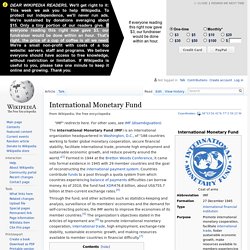
"[1] Formed in 1944 at the Bretton Woods Conference, it came into formal existence in 1945 with 29 member countries and the goal of reconstructing the international payment system. Countries contribute funds to a pool through a quota system from which countries experiencing balance of payments difficulties can borrow money. As of 2010[update], the fund had XDR476.8 billion, about US$755.7 billion at then-current exchange rates.[4] Functions[edit] The IMF's role was fundamentally altered by the floating exchange rates post-1971. International Maritime Organization. IMO headquarters in London The International Maritime Organization (IMO), known as the Inter-Governmental Maritime Consultative Organization (IMCO) until 1982,[3] was established in Geneva in 1948[4] and came into force ten years later, meeting for the first time in 1959.
Headquartered in London, United Kingdom, the IMO is a specialized agency of the United Nations with 170 Member States and three Associate Members.[3] The IMO's primary purpose is to develop and maintain a comprehensive regulatory framework for shipping and its remit today includes safety, environmental concerns, legal matters, technical co-operation, maritime security and the efficiency of shipping. IMO is governed by an Assembly of members and is financially administered by a Council of members elected from the Assembly.
The work of IMO is conducted through five committees and these are supported by technical subcommittees. International Labour Organization. In 1969, the organization received the Nobel Peace Prize for improving peace among classes, pursuing justice for workers, and providing technical assistance to developing nations.[1] The ILO registers complaints against entities that are violating international rules; however, it does not impose sanctions on governments.[3] Governance, organization, and membership[edit] ILO headquarters in Geneva. International Fund for Agricultural Development. IFAD logo The International Fund for Agricultural Development (IFAD) (French: Fonds international de développement agricole; FIDA) (Italian: Fondo Internazionale per lo Sviluppo Agricola) is a specialized agency of the United Nations dedicated to eradicating rural poverty in developing countries.
It was established as an international financial institution in 1977 as one of the major outcomes of the 1974 World Food Conference. Seventy-five per cent of the world's poor live in rural areas in developing countries, yet only 4% of official development assistance goes to agriculture. The strategic policy of IFAD is detailed in Strategic Framework for IFAD 2011–2015: Enabling the Rural Poor to Overcome Poverty. International Civil Aviation Organization. The International Civil Aviation Organization (ICAO, pronounced /aɪˈkeɪoʊ/; French: Organisation de l'aviation civile internationale, OACI), is a specialized agency of the United Nations. It codifies the principles and techniques of international air navigation and fosters the planning and development of international air transport to ensure safe and orderly growth.
Its headquarters are located in the Quartier International of Montreal, Quebec, Canada. The ICAO Council adopts standards and recommended practices concerning air navigation, its infrastructure, flight inspection, prevention of unlawful interference, and facilitation of border-crossing procedures for international civil aviation.
ICAO defines the protocols for air accident investigation followed by transport safety authorities in countries signatory to the Convention on International Civil Aviation (Chicago Convention). International Atomic Energy Agency. The International Atomic Energy Agency (IAEA) is an international organisation that seeks to promote the peaceful use of nuclear energy, and to inhibit its use for any military purpose, including nuclear weapons. The IAEA was established as an autonomous organisation on 29 July 1957. Food and Agriculture Organization. The Food and Agriculture Organization of the United Nations (FAO; French: Organisation des Nations unies pour l'alimentation et l'agriculture, Italian: Organizzazione delle Nazioni Unite per l'Alimentazione e l'Agricoltura) is an agency of the United Nations that leads international efforts to defeat hunger.
Serving both developed and developing countries, FAO acts as a neutral forum where all nations meet as equals to negotiate agreements and debate policy. FAO is also a source of knowledge and information, and helps developing countries and countries in transition modernize and improve agriculture, forestry and fisheries practices, ensuring good nutrition and food security for all. Its Latin motto, fiat panis, translates as "let there be bread".